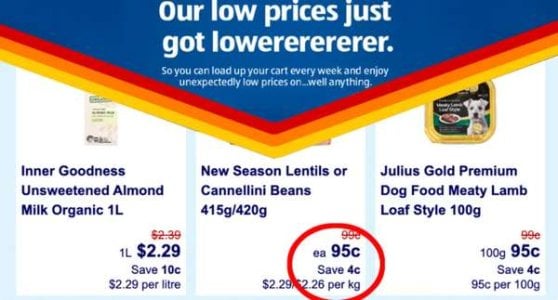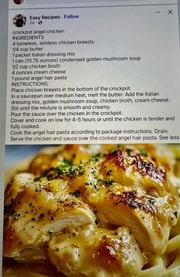'Are these really specials?': Supermarkets ‘savings scheme’ exposed
By
Danielle F.
- Replies 7
It's easy to get swept up in the excitement of a 'bargain' when shopping. After all, who doesn't want a good deal?
What if those bargains are different from what they seem?
Several Aussie retail giants have recently been accused of their advertised savings being more of an illusion than a substance.
A 58-year-old ALDI shopper voiced her frustration after receiving an email from the supermarket chain highlighting their 'latest reductions'.
'It's a disgrace to even advertise "4c" as a "saving" on any item, and it certainly doesn't have me wanting to rush in to stock up. I had thought better of ALDI,' she shared.
The disappointment was palpable when 'special items' were a mere pittance off the original price.
'I have to ask, "Are these truly specials?" I would deem only one of six items shown as a true special at $1.50 off the regular price,' she said.
The issue is not isolated to ALDI—Kmart recently came under fire for its 'price drop' promotions.
Marketing expert and Australian National University professor Dr Andrew Hughes noted the minimal reduction on some Kmart items, which were a mere price change from $7 to $6.75.
He then expressed dismay at such tactics, labelling them disrespectful to consumers.
'I think doing four cents off is just saying, "You really are idiots, and we've got you fooled," and I hate that, I really do,' he said.
'I thought, "Wow, is that how much you think of us, that that's a reduction?" It's like 25 cents. And I get it. It's still 25 cents, but to me, it's just 25 cents. It's nuts.'
"They put the date on it, so it's like saying: "We dropped the price! What more do you want?" But we have no idea what the price may have been at the start of this year, so is it really a reduction or just done to make it seem like one?' he concluded.
This type of marketing, while not necessarily 'evil', was described by Hughes as 'really unethical'.
'What they're not saying is whether it's the actual price equity (e.g., per 100 g) or that the price is the same as the packet,' he said.
'We don't know if the fabric is of lesser quality than what it was when it was $7, and I might have preferred the $7 price, knowing that the quality of the fabric is still better.'
The practice could prey on the consumer's lack of daily price awareness and the tendency to gravitate towards the cheaper item.
Another tactic supermarkets use to entice consumers is using specific colours on tags.
Retail marketing expert Louise Grimer shared that colours such as red and yellow create a sense of urgency.
'It's the scarcity effect', she shared, as these tags were designed to prompt consumers to make quick purchases under a time-sensitive deal.
Consumer advocacy group CHOICE weighed in on the matter and criticised retailers for not acknowledging the potential harm caused by confusing labelling.
'This is particularly concerning considering many people are trying to make their grocery shop as affordable as possible in a cost of living crisis,' Rosie Thomas, CHOICE Director of Campaigns and Communications, said.
Terms like 'prices dropped' or 'super savers' can be deceptive.
Their investigation revealed instances where a 'prices dropped' tag was used in Woolworths for a product whose price had stayed the same for nearly five years.
CHOICE called for transparency so shoppers can discern the truth for themselves.
It's essential to stay informed when navigating supermarket and retail aisles.
While everyone loves a good deal, it's crucial to scrutinise the savings offered.
Here are some tips to ensure you're not being taken advantage of:
While Kmart has not yet responded to the issue, the retailer previously stated that they aim to reduce prices permanently, as over 1,300 products went through the price cut this year alone.

Have you encountered similar 'savings' that didn't add up? Share your stories and tips on ensuring discounts in the comments below.
What if those bargains are different from what they seem?
Several Aussie retail giants have recently been accused of their advertised savings being more of an illusion than a substance.
A 58-year-old ALDI shopper voiced her frustration after receiving an email from the supermarket chain highlighting their 'latest reductions'.
'It's a disgrace to even advertise "4c" as a "saving" on any item, and it certainly doesn't have me wanting to rush in to stock up. I had thought better of ALDI,' she shared.
The disappointment was palpable when 'special items' were a mere pittance off the original price.
'I have to ask, "Are these truly specials?" I would deem only one of six items shown as a true special at $1.50 off the regular price,' she said.
The issue is not isolated to ALDI—Kmart recently came under fire for its 'price drop' promotions.
Marketing expert and Australian National University professor Dr Andrew Hughes noted the minimal reduction on some Kmart items, which were a mere price change from $7 to $6.75.
He then expressed dismay at such tactics, labelling them disrespectful to consumers.
'I think doing four cents off is just saying, "You really are idiots, and we've got you fooled," and I hate that, I really do,' he said.
'I thought, "Wow, is that how much you think of us, that that's a reduction?" It's like 25 cents. And I get it. It's still 25 cents, but to me, it's just 25 cents. It's nuts.'
"They put the date on it, so it's like saying: "We dropped the price! What more do you want?" But we have no idea what the price may have been at the start of this year, so is it really a reduction or just done to make it seem like one?' he concluded.
This type of marketing, while not necessarily 'evil', was described by Hughes as 'really unethical'.
'What they're not saying is whether it's the actual price equity (e.g., per 100 g) or that the price is the same as the packet,' he said.
'We don't know if the fabric is of lesser quality than what it was when it was $7, and I might have preferred the $7 price, knowing that the quality of the fabric is still better.'
The practice could prey on the consumer's lack of daily price awareness and the tendency to gravitate towards the cheaper item.
Another tactic supermarkets use to entice consumers is using specific colours on tags.
Retail marketing expert Louise Grimer shared that colours such as red and yellow create a sense of urgency.
'It's the scarcity effect', she shared, as these tags were designed to prompt consumers to make quick purchases under a time-sensitive deal.
Consumer advocacy group CHOICE weighed in on the matter and criticised retailers for not acknowledging the potential harm caused by confusing labelling.
'This is particularly concerning considering many people are trying to make their grocery shop as affordable as possible in a cost of living crisis,' Rosie Thomas, CHOICE Director of Campaigns and Communications, said.
Terms like 'prices dropped' or 'super savers' can be deceptive.
Their investigation revealed instances where a 'prices dropped' tag was used in Woolworths for a product whose price had stayed the same for nearly five years.
CHOICE called for transparency so shoppers can discern the truth for themselves.
It's essential to stay informed when navigating supermarket and retail aisles.
While everyone loves a good deal, it's crucial to scrutinise the savings offered.
Here are some tips to ensure you're not being taken advantage of:
- Track the prices of items you regularly purchase to recognise when a discount is genuine.
- Be wary of marketing language and colours designed to create a sense of urgency.
- Consider the quality of the product and whether a slight price reduction is worth a potential drop in quality.
- Remember that if a deal seems too good to be true, it probably is.
While Kmart has not yet responded to the issue, the retailer previously stated that they aim to reduce prices permanently, as over 1,300 products went through the price cut this year alone.
Key Takeaways
- ALDI and Kmart were criticised for advertising small discounts as special savings.
- A marketing expert expressed disappointment in the 'price drop' marketing approach and described it as 'unethical'.
- Consumer advocacy group CHOICE flagged concerns about misleading labelling and the impact of these practices on shoppers.
- ALDI and Kmart responded to the raised issues, saying that products may show permanent price reductions.








